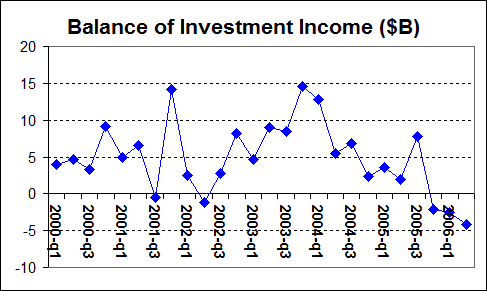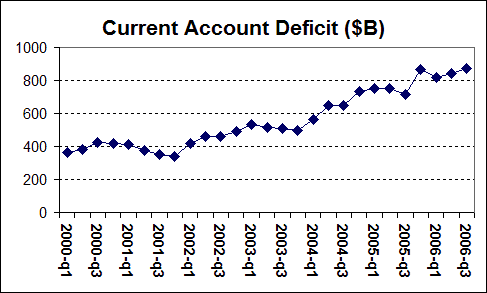Investment flow defict New threat to the Dollar - The Mike Tyson Economy
Economics / Analysis & Strategy Feb 25, 2007 - 12:05 AM GMTBy: Jim_Willie_CB
Don't look now, but a new emergent monster is growing, this one a close cousin to the trade gap. We have all been subjected to the steady deterioration in the trade gap, from gargantuan imported product sales from Asian (mostly Chinese, but also Pacific Rim) finished goods, worsened by oil imports (MidEast, Canada, and Mexico).
The source of trade deficits used to be primarily electronics from the Pacific Rim and oil from the MidEast. Now it is a cornucopia of finished products from China like furniture, housewares, furniture, garden items, and a mix of pirated products like car parts.
Why mention Mike Tyson? Easy. The entire world looks upon the United States as a grand territory of wealth production. Sure, it generates some wealth, notwithstanding its frequent source from the financial sector (including housing and debt processing). The entire financial sector is crucially dependent upon the printing of money and the creation of new debt. Without those two foundations, the USEconomy dries up like a worm on a desert roadway. The real fundamental story is founded in the irresponsible, desperate, and uncontrollable spending side of the equation.
Mike Tyson made many million$ from his boxing career, as he attained the pinnacle of the heavyweight boxing world. But he spent more million$ than he earned. He squandered his money, surrounded himself by an entourage of admirers, henchmen, leeches, parasites, and conmen, even as he enjoyed the life of excesses in the lap of luxury. He spared no expense. He ended up broke as a result of his obtuse money management. The gap between his front upper teeth serves as symbolic parallel to the USEconomic trade gap. Sorry, Mike, but please don't hurt me. Michael Jackson (the bizarre rock star unequaled genius) has also developed a spending problem, but unlike Tyson, he invested brilliantly in the Beatles music royalty properties. Soon, that might be his only major asset. But the USEconomy, much like Tyson, has overspent beyond its means, and done so by a long shot. Stories abound in the US of profligate spending by the wealthy, some of whom overdo it to the point of going bankrupt. They are under budget stresses, just like the Middle Class. It seems Iron Mike bit off more than Hollyfield's ear; he bit off his own personal treasure. So has the US public.
The next threat embodies a deficit not seen for decades, as far as my memory serves, perhaps never. The United States has always been a haven for investors. Separate from the Wall Street backfire from the Sarbanes Oxley Act which burdens accounting of public firms, but surely not limited to that factor, the investment flow has turned negative. Its margin evident in the change of income has made a critical sea change. The threat to the USDollar is to a staggering degree, since at this margin of income from investment has turned from favorable to harmful. The housing market decline will only further wreck the balance further. More details are available in the November issue of the Hat Trick Letter , out two weeks ago.
BURDEN ADDED TO TRADE GAP
When pondering the trade gap, the central paradox to traditional economists in the last few years has been its growth in that trade gap despite a USDollar devaluation. Back in 2001, when the trade weighted (biased to euro currency) topped at the 121 level, economists were encouraged that a lower US$ exchange rate would lift US exports and relieve the trade gap. NOT ME!!! My forecast was for a much worse trade gap despite the lower USDollar.
The reasoning was simple. The United States had abandoned its manufacturing base, having dispatched it to Asia, and the USEconomy has been heavily devoted to consumer spending, being supplied by Asia. Most important, any currency adjustment would not involve the Asian currencys, as the Chinese yuan was pegged to the USDollar. The currency games would be inflicted on Europe and Canada, in my view. My analysis was based upon a rising crude oil price, with its own trade deficit to the Middle East, Canada, and Mexico. To a minimal extent, the investment surplus in recent years formerly would offset the trade gap to render it not quite so horrible, but still terrible.
The trade gap considers the total of goods & services bought & sold in the USEconomy, tangible products plus specific work done on fixed assets. We all understand the goods portion. The assets include our physical bodies, like with dental, medical, optometry, but also legal, and financial work. Other fixed assets serviced are such objects as houses & buildings, HVAC (heating, ventilation, air conditioning), industrial equipment, computer systems, communications systems, and so on.
The CURRENT ACCOUNT is composed of the trade account plus the investment account. For a great many years, the current account deficit has been slightly lower than the trade gap. The United States has been a great attraction for foreign investment, which includes stocks, bonds, property, and intellectual property (IP). The tangible property encompasses residential houses, commercial buildings, industrial plant, and land. The IP covers patents and copyrights, for books, music, movies, and software, paid in royalties. China greatly assists their trade surplus by not paying much in IP royalties, probably the most distinctive black eye they carry in the view of the World Trade Organization. Then again, since China owns almost $1000 billion in foreign reserves, nobody will take them to task over their blatant, chronic, and unaddressed fraud.
For many years, even the last few up through 2005, the investment flows have been brisk into US-based assets. Foreigners tremendously lifted Florida property prices, especially in the Miami metro area. With the housing market stall, and the falling US Dollar, expect a decline in foreign investment generally. All during 2006, the rage was foreign destinations for money flow, even among developed nations like in Europe. The key signal to observe on sea change is the balance of investment income, from stock dividends, bond yields, property rents, and IP royalties. Behind the drop in income comes a drop in the investments themselves.

A dangerous change can be detected, starting in 4Q2005, which continues to worsen. For the four quarters ending 3Q2005, the average net income due to foreign investment is plus $3.95 billion. In the last three reported quarters, net investment income has averaged minus $2.94 billion. To date the recent Q3 data has not been updated. One is hard pressed to find any consecutive quarters with a net loss in recent years dating back to 1990. The sea change is here, previewed by the income directional shift. For some time, the current account deficit chart has resembled that of the trade gap.
A slower US Economy from exhausted consumers and a housing decline, to be witnessed by early next year, will likely relieve the trade gap to a small extent. We will consume less, buy less from Asia, and probably spend less on oil imports. However, the nasty rub will be that the investment gap will grow worse, along with its income component. The overall net statistic that matters most in this regard for the United States is the current account deficit, the final report card of money coming in versus money going out. It is not likely to improve with a slower US Economy, due to the investment reversal of fortune. This point is simply absent on the radar screen.

The paradox next to reveal itself on this subject is a second chapter. The first paradoxical chapter highlighted the big rise in our trade gap despite a significant devaluation in the USDollar. The second chapter will highlight the decline in the trade gap as the USEconomy sharply slows down. However, the current account deficit will not be given any assist whatsoever by investment flows, which will aggravate the still chronic trade gap.
The investment gap is sure to worsen in my analysis. Consider this. When Asians or Arabs gather in surplus revenue each month, they immediately look to neutralize the effect on their own currencies. This is called sterilization, as they convert surpluses into US Treasury Bonds typically, but not exclusively. The investment gap has a different dynamic at work, one at the other end of the balance, the destination side. Sterilization is not the issue here, but preservation of wealth accumulated and stored, as well as basic new investment. If the housing market turns into a horrible bear market, as my forecasts indicate, the USDollar will reflect that retreat. If the stock market rolls over and falls from the upcoming USEconomic recession, as my forecasts indicate, the USDollar will reflect that downturn. If we reach a critical inflection point in low long-term bond yields, enough for foreigners to turn tail and abandon the US$-based securities, the USDollar will reflect that reversal.
The USDollar has a new threat, one extremely likely to worsen to a much greater extent. Finally, the fundamentals are to burn the candle at both ends, from tangibles (goods & services) but also from investments (bases & income). Watch the current account deficit remain in crisis mode, and not repair. Remove focus upon the trade deficit. The other deficit component to the current account has turned down, without any publicity whatsoever. The balance of investment income foretells of a new stress agent !!!
By Jim Willie CB
Editor of the “HAT TRICK LETTER”
www.GoldenJackass.com
www.GoldenJackass.com/subscribe.html
Use the above link to subscribe to the paid research reports, which include coverage of several smallcap companies positioned to rise like a cantilever during the ongoing panicky attempt to sustain an unsustainable system burdened by numerous imbalances aggravated by global village forces. An historically unprecedented mess has been created by heretical central bankers and charlatan economic advisors, whose interference has irreversibly altered and damaged the world financial system. Analysis features Gold, Crude Oil, USDollar, Treasury bonds, and inter-market dynamics with the US Economy and US Federal Reserve monetary policy. A tad of relevant geopolitics is covered as well. Articles in this series are promotional, an unabashed gesture to induce readers to subscribe.
The golden jackass is designed to inform and instruct in the complex ways of gold, currencies, bonds, interest rates, stocks, commodities, futures, derivatives, and the world economy, with no respect shown for inept bankers and economists, whose policies and practices contribute toward the slow motion degradation, if not destruction, of the financial world ~ Jim Willie CB, aka "The Golden Jackass" www.GoldenJackass.com
© 2005-2022 http://www.MarketOracle.co.uk - The Market Oracle is a FREE Daily Financial Markets Analysis & Forecasting online publication.



